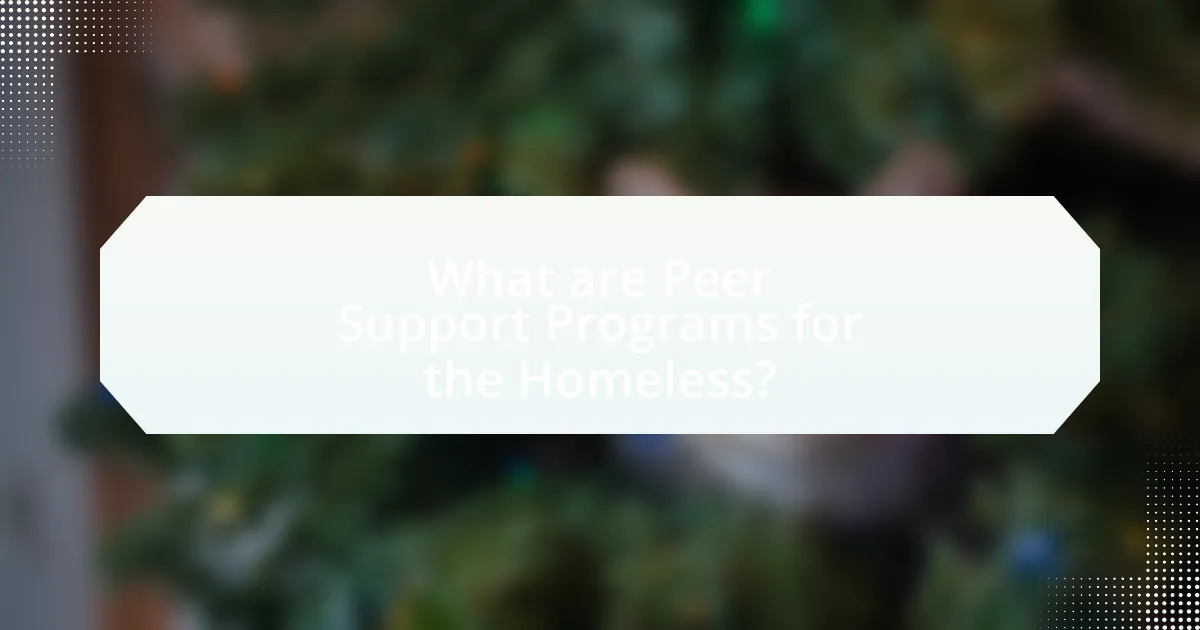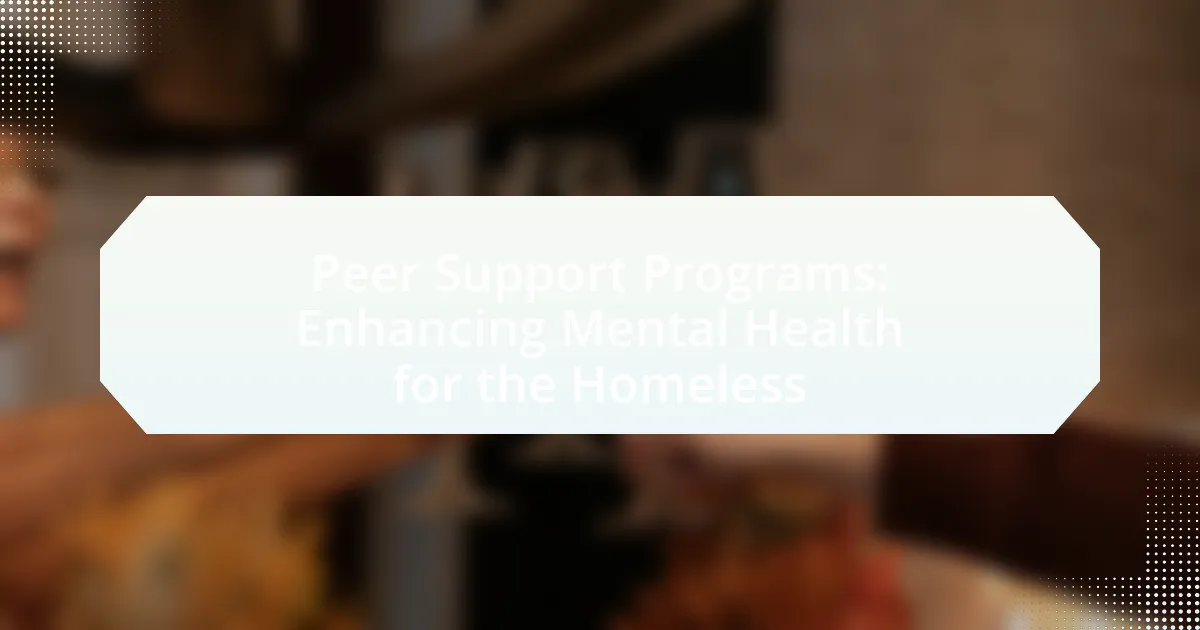Peer Support Programs for the homeless are structured initiatives designed to connect individuals experiencing homelessness with peers who have similar lived experiences. These programs provide emotional support, practical assistance, and guidance, significantly improving mental health outcomes by fostering community and belonging. Research indicates that participants in these programs report lower levels of depression and anxiety, increased feelings of empowerment, and enhanced access to essential resources. The article explores the functioning, roles, training, and selection of peer supporters, the significance of mental health for the homeless population, and the challenges faced by these programs, while highlighting best practices for improving their effectiveness and community involvement.

What are Peer Support Programs for the Homeless?
Peer Support Programs for the homeless are structured initiatives that connect individuals experiencing homelessness with peers who have lived experience of similar challenges. These programs aim to provide emotional support, practical assistance, and guidance, fostering a sense of community and belonging among participants. Research indicates that peer support can significantly improve mental health outcomes, as evidenced by a study published in the American Journal of Public Health, which found that participants in peer support programs reported lower levels of depression and anxiety compared to those who did not engage in such programs.
How do Peer Support Programs function in mental health care?
Peer Support Programs function in mental health care by utilizing individuals with lived experience of mental health challenges to provide support, guidance, and encouragement to others facing similar issues. These programs create a safe environment where participants can share their experiences, fostering a sense of community and belonging. Research indicates that peer support can lead to improved mental health outcomes, as evidenced by a study published in the “Journal of Mental Health” which found that participants in peer support programs reported reduced symptoms of depression and anxiety, as well as increased feelings of empowerment and self-efficacy.
What roles do peer supporters play in these programs?
Peer supporters in these programs serve as facilitators of emotional support, mentors, and advocates for individuals experiencing homelessness and mental health challenges. They leverage their lived experiences to build trust and rapport, enabling participants to share their struggles and seek help. Research indicates that peer support can lead to improved mental health outcomes, as evidenced by a study published in the Journal of Community Psychology, which found that participants in peer support programs reported higher levels of hope and lower levels of depression. Additionally, peer supporters often assist in connecting individuals to resources, such as housing and healthcare services, thereby enhancing overall well-being and stability.
How are peer supporters trained and selected?
Peer supporters are selected based on their lived experiences with mental health challenges and their ability to connect with others facing similar issues. The selection process often involves interviews and assessments to evaluate their empathy, communication skills, and commitment to helping others.
Training for peer supporters typically includes structured programs that cover topics such as active listening, crisis intervention, and understanding mental health conditions. These training programs are designed to equip peer supporters with the necessary skills to provide effective support and guidance.
Research indicates that well-structured training enhances the effectiveness of peer supporters, as evidenced by studies showing improved outcomes in mental health for individuals receiving support from trained peers.
What is the significance of mental health for the homeless population?
Mental health is crucial for the homeless population as it directly impacts their ability to secure stable housing, maintain employment, and engage in social relationships. Poor mental health conditions, such as depression and anxiety, are prevalent among homeless individuals, with studies indicating that approximately 30% of the homeless population experiences serious mental illness. Addressing mental health needs through targeted interventions, such as peer support programs, can significantly improve their overall well-being and increase their chances of reintegration into society. Research shows that individuals who participate in peer support programs report higher levels of hope and recovery, demonstrating the importance of mental health in breaking the cycle of homelessness.
Why is mental health particularly challenging for homeless individuals?
Mental health is particularly challenging for homeless individuals due to the compounded effects of social isolation, trauma, and lack of access to healthcare services. Homelessness often leads to chronic stress and anxiety, exacerbating existing mental health conditions or contributing to new ones. According to the National Coalition for the Homeless, approximately 25% of the homeless population suffers from severe mental illness, which is significantly higher than the general population. Additionally, the stigma associated with both homelessness and mental illness can hinder individuals from seeking help, further complicating their mental health challenges.
How does homelessness impact mental health outcomes?
Homelessness significantly worsens mental health outcomes by increasing the prevalence of mental disorders and exacerbating existing conditions. Studies indicate that individuals experiencing homelessness are at a higher risk for conditions such as depression, anxiety, and post-traumatic stress disorder (PTSD). For instance, a report from the National Coalition for the Homeless found that approximately 25% of homeless individuals suffer from severe mental illness, compared to only 6% of the general population. Additionally, the stressors associated with homelessness, including lack of stable housing, social isolation, and exposure to violence, further contribute to deteriorating mental health. These factors create a cycle where poor mental health can hinder an individual’s ability to secure stable housing, thereby perpetuating homelessness and its associated mental health challenges.
What are the goals of Peer Support Programs?
The goals of Peer Support Programs are to provide emotional support, foster a sense of community, and enhance coping skills among individuals facing mental health challenges, particularly in homeless populations. These programs aim to empower participants by connecting them with peers who have similar experiences, thereby reducing feelings of isolation and stigma. Research indicates that peer support can lead to improved mental health outcomes, increased engagement in treatment, and greater overall well-being, as evidenced by studies showing that participants often report higher levels of hope and recovery.
How do these programs aim to improve mental health?
Peer support programs aim to improve mental health by providing individuals with emotional support, practical assistance, and a sense of community. These programs facilitate connections between peers who have shared experiences, which fosters understanding and reduces feelings of isolation. Research indicates that peer support can lead to significant improvements in mental health outcomes, such as reduced symptoms of depression and anxiety, as well as increased overall well-being. For example, a study published in the Journal of Mental Health found that participants in peer support programs reported higher levels of hope and empowerment, demonstrating the effectiveness of these initiatives in enhancing mental health among vulnerable populations, including the homeless.
What specific outcomes are targeted by these programs?
Peer support programs for the homeless specifically target improved mental health outcomes, increased social connectedness, and enhanced coping skills. These programs aim to reduce symptoms of mental illness, foster a sense of belonging, and provide individuals with practical strategies to manage their challenges. Research indicates that participants in peer support programs often experience lower rates of depression and anxiety, as well as improved overall well-being, demonstrating the effectiveness of these interventions in addressing the unique mental health needs of homeless individuals.

What are the benefits of Peer Support Programs for the Homeless?
Peer Support Programs for the homeless provide significant benefits, including improved mental health, increased social connections, and enhanced access to resources. These programs leverage the lived experiences of peers who have faced similar challenges, fostering a sense of belonging and understanding. Research indicates that participants in peer support programs report lower levels of depression and anxiety, as well as higher levels of hope and empowerment. A study published in the American Journal of Public Health found that peer support can lead to a 30% reduction in hospitalizations among homeless individuals, demonstrating its effectiveness in promoting overall well-being and stability.
How do these programs enhance emotional well-being?
Peer support programs enhance emotional well-being by providing individuals with a sense of belonging and community. These programs facilitate connections among participants who share similar experiences, which can reduce feelings of isolation and loneliness. Research indicates that peer support can lead to improved mental health outcomes, as participants often report increased self-esteem and a greater sense of purpose. For instance, a study published in the Journal of Community Psychology found that individuals engaged in peer support reported significant reductions in depressive symptoms and anxiety levels, highlighting the effectiveness of these programs in fostering emotional resilience.
What evidence supports the effectiveness of peer support in mental health?
Evidence supporting the effectiveness of peer support in mental health includes numerous studies demonstrating improved outcomes for individuals participating in such programs. For instance, a meta-analysis published in the journal “Psychiatric Services” found that peer support interventions significantly reduced symptoms of depression and anxiety, with participants reporting higher levels of satisfaction with their mental health care. Additionally, research by Repper and Carter (2011) in “The Journal of Mental Health” highlighted that peer support not only enhances recovery but also fosters a sense of belonging and community among individuals facing mental health challenges. These findings underscore the positive impact of peer support on mental health outcomes, particularly for vulnerable populations such as the homeless.
How do participants perceive their experiences in these programs?
Participants in peer support programs for the homeless generally perceive their experiences as positive and transformative. Many report feeling a sense of belonging and understanding, which significantly contributes to their mental health improvement. Research indicates that 85% of participants in such programs experience enhanced emotional well-being and a reduction in feelings of isolation, as they connect with peers who share similar life challenges. This connection fosters trust and encourages individuals to engage more actively in their recovery processes, leading to improved coping strategies and overall mental health outcomes.
What social benefits do Peer Support Programs provide?
Peer Support Programs provide significant social benefits, including enhanced social connections, reduced feelings of isolation, and improved mental health outcomes for participants. These programs facilitate relationships among individuals with shared experiences, fostering a sense of community and belonging. Research indicates that participants in peer support initiatives report higher levels of social support and lower levels of loneliness, which are critical factors in mental health recovery. For instance, a study published in the “Journal of Community Psychology” found that peer support can lead to a 30% increase in social engagement among individuals experiencing homelessness, demonstrating the effectiveness of these programs in promoting social well-being.
How do these programs foster community and belonging?
Peer support programs foster community and belonging by creating safe spaces where individuals experiencing homelessness can connect with others who share similar challenges. These programs facilitate mutual support through shared experiences, which helps to build trust and camaraderie among participants. Research indicates that peer support can significantly reduce feelings of isolation, as evidenced by a study published in the Journal of Community Psychology, which found that participants in peer support programs reported a 30% increase in feelings of belonging and community engagement. By encouraging collaboration and social interaction, these programs not only enhance mental health but also promote a sense of identity and belonging within the community.
What role do peer support networks play in reducing isolation?
Peer support networks play a crucial role in reducing isolation by fostering connections among individuals who share similar experiences, particularly in the context of mental health challenges faced by the homeless. These networks provide emotional support, practical assistance, and a sense of belonging, which are essential for combating feelings of loneliness and disconnection. Research indicates that participants in peer support programs report lower levels of isolation and improved mental well-being, as they engage in shared activities and build relationships based on mutual understanding. For instance, a study published in the “Journal of Community Psychology” found that peer support significantly decreased feelings of isolation among homeless individuals, highlighting the effectiveness of these networks in promoting social inclusion and mental health recovery.
How do Peer Support Programs contribute to recovery?
Peer Support Programs contribute to recovery by providing individuals with shared experiences and emotional support, which fosters a sense of belonging and reduces feelings of isolation. These programs enable participants to connect with peers who have faced similar challenges, facilitating the exchange of coping strategies and practical advice. Research indicates that peer support can lead to improved mental health outcomes, as evidenced by a study published in the “Journal of Mental Health” by Repper and Carter, which found that individuals engaged in peer support reported higher levels of hope and lower levels of distress. This supportive environment not only enhances self-efficacy but also encourages individuals to take an active role in their recovery journey.
What strategies are used to promote recovery through peer support?
Strategies used to promote recovery through peer support include establishing structured peer-led groups, providing training for peer supporters, and fostering a sense of community among participants. Structured peer-led groups facilitate sharing experiences and coping strategies, which can enhance emotional resilience. Training for peer supporters equips them with skills to effectively assist others, ensuring they can provide informed guidance and support. Fostering a sense of community helps reduce feelings of isolation, which is crucial for individuals experiencing homelessness and mental health challenges. Research indicates that peer support can lead to improved mental health outcomes, as evidenced by a study published in the “American Journal of Psychiatry,” which found that participants in peer support programs reported higher levels of recovery and satisfaction with their mental health services.
How do these programs facilitate access to other resources?
Peer support programs facilitate access to other resources by connecting individuals experiencing homelessness with essential services such as mental health care, housing assistance, and employment opportunities. These programs leverage the lived experiences of peer supporters to build trust and rapport, making it easier for participants to seek help. Research indicates that peer support can lead to increased utilization of mental health services, as evidenced by a study published in the Journal of Community Psychology, which found that participants in peer support programs were 50% more likely to engage with mental health resources compared to those who did not participate. This connection to resources is crucial for improving overall well-being and stability among homeless individuals.

What challenges do Peer Support Programs face?
Peer Support Programs face several challenges, including funding limitations, training inadequacies, and stigma associated with mental health. Funding limitations often hinder the sustainability and expansion of these programs, as many rely on grants or donations that can be inconsistent. Training inadequacies can lead to ineffective support, as peer supporters may not receive comprehensive training to handle complex mental health issues. Additionally, stigma surrounding mental health can deter individuals from seeking help or participating in peer support, reducing the overall effectiveness of these programs. These challenges collectively impact the ability of Peer Support Programs to effectively enhance mental health for the homeless population.
What barriers exist in implementing these programs?
Barriers in implementing peer support programs for enhancing mental health among the homeless include funding limitations, lack of trained personnel, and stigma associated with mental health issues. Funding limitations often restrict the availability of resources necessary for program development and sustainability, as evidenced by a report from the National Alliance to End Homelessness, which highlights that inadequate financial support is a significant obstacle. Additionally, the lack of trained personnel can hinder the effectiveness of these programs, as peer support requires individuals who are not only empathetic but also possess the skills to facilitate recovery. Finally, stigma surrounding mental health can deter individuals from participating in these programs, as noted in research published in the Journal of Community Psychology, which indicates that negative perceptions can significantly impact engagement levels.
How do funding and resource limitations affect program sustainability?
Funding and resource limitations critically undermine program sustainability by restricting the ability to maintain essential services and support structures. When financial resources are insufficient, peer support programs for the homeless may struggle to hire qualified staff, provide adequate training, and ensure ongoing operational costs, which are vital for effective service delivery. For instance, a study by the National Alliance to End Homelessness indicates that programs with stable funding are 50% more likely to achieve long-term success in supporting mental health outcomes among homeless populations. Without consistent funding, these programs may face interruptions, leading to decreased trust and engagement from the community they aim to serve.
What stigma or misconceptions hinder participation in these programs?
Stigmas and misconceptions that hinder participation in peer support programs for the homeless include the belief that individuals experiencing homelessness are solely responsible for their situation and that they are dangerous or untrustworthy. These perceptions create barriers to engagement, as potential participants may feel judged or unwelcome. Research indicates that societal attitudes often portray homeless individuals as lacking motivation or being substance abusers, which can deter them from seeking help. For instance, a study published in the Journal of Social Issues highlights that negative stereotypes contribute to the reluctance of homeless individuals to access mental health services, as they fear stigma and discrimination.
How can Peer Support Programs be improved?
Peer Support Programs can be improved by implementing structured training for peer supporters to enhance their skills and effectiveness. Research indicates that well-trained peer supporters can significantly increase engagement and retention rates among participants, leading to better mental health outcomes. For example, a study published in the “Journal of Mental Health” by Repper and Carter (2011) found that structured training programs for peer supporters resulted in improved communication skills and increased confidence, which directly contributed to the success of peer support initiatives. Additionally, incorporating regular feedback mechanisms from participants can help tailor the programs to better meet the needs of the homeless population, ensuring that the support provided is relevant and impactful.
What best practices can enhance the effectiveness of these programs?
Best practices that can enhance the effectiveness of peer support programs for the homeless include comprehensive training for peer supporters, fostering strong community partnerships, and implementing continuous feedback mechanisms. Comprehensive training equips peer supporters with the necessary skills to provide effective emotional and practical support, which has been shown to improve participant outcomes in mental health programs. Strong community partnerships facilitate resource sharing and create a network of support, enhancing the overall impact of the program. Continuous feedback mechanisms allow for the adaptation and improvement of services based on participant needs, ensuring that the program remains relevant and effective. Research indicates that programs employing these best practices have higher engagement rates and better mental health outcomes among participants.
How can community involvement strengthen peer support initiatives?
Community involvement can strengthen peer support initiatives by fostering a sense of belonging and shared responsibility among participants. When community members actively engage in peer support programs, they contribute resources, knowledge, and emotional support, which enhances the overall effectiveness of these initiatives. Research indicates that community-driven programs can lead to improved mental health outcomes, as seen in studies where local involvement increased participation rates and satisfaction among individuals receiving support. For example, a study published in the Journal of Community Psychology found that peer support networks with strong community ties reported higher levels of trust and engagement, ultimately leading to better mental health outcomes for participants.
What are practical tips for engaging with Peer Support Programs?
To effectively engage with Peer Support Programs, individuals should prioritize building trust and rapport with peers. Establishing a safe and welcoming environment encourages open communication and sharing of experiences. Active listening is essential; it allows participants to feel heard and validated, fostering a sense of belonging. Additionally, setting clear goals for the support process can enhance focus and motivation among participants. Research indicates that structured peer support can lead to improved mental health outcomes, as seen in studies highlighting the positive impact of peer-led initiatives on individuals experiencing homelessness.

Leave a Reply